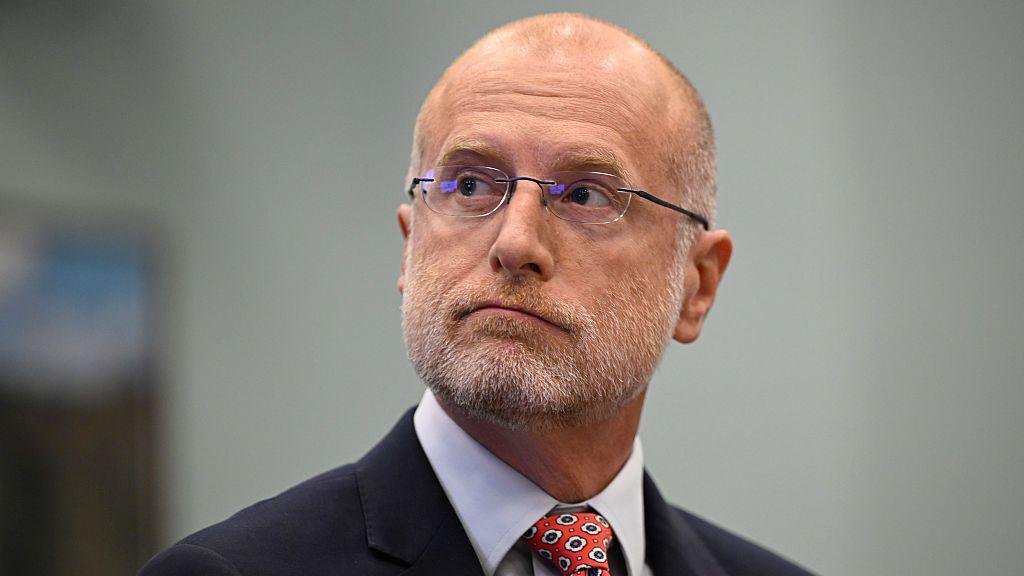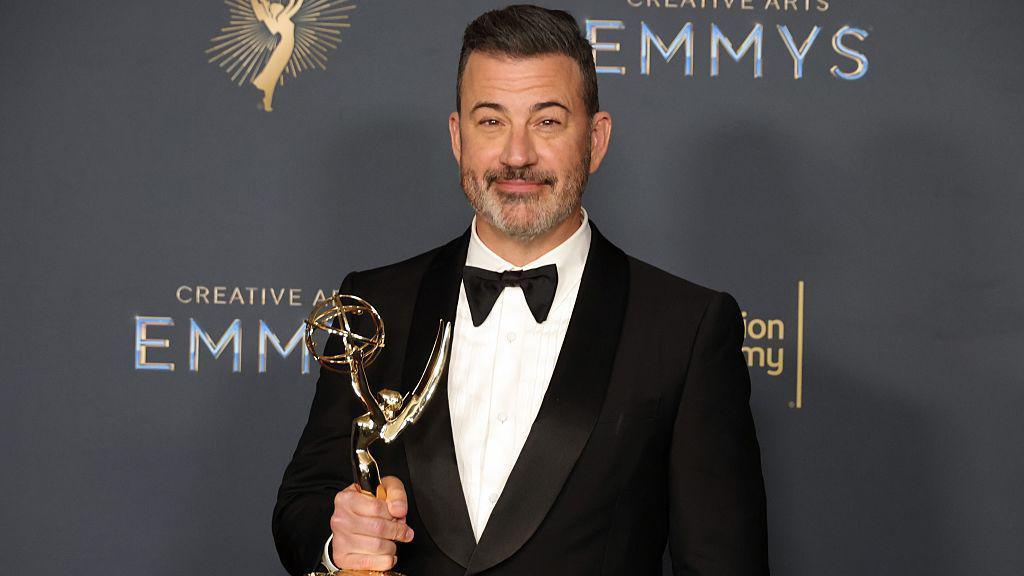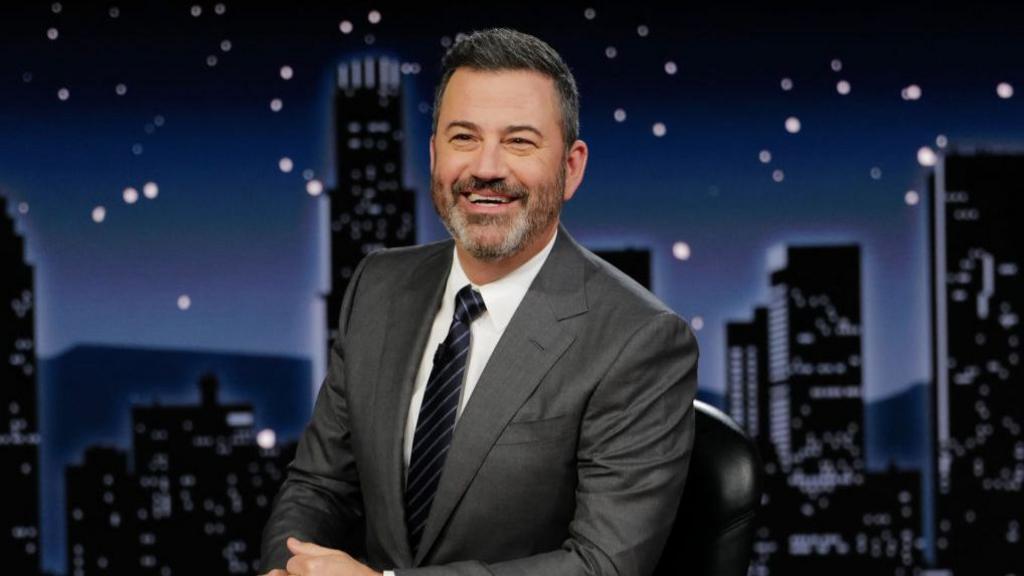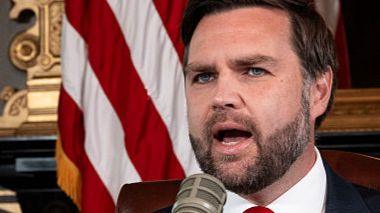Brendan Carr's emboldened FCC takes on Trump's media foes

Brendan Carr has said that the US media landscape is in a 'very disruptive moment'
- Published
After nearly 23 years on American airwaves, comedian Jimmy Kimmel's ABC show is on ice.
He was suspended indefinitely by the network after he made comments in the wake of Charlie Kirk's murder, which mocked the president and appeared to cast blame on his supporters.
A lynchpin in the late-night comedy line-up, Kimmel is the latest media personality to fall foul of the Trump administration in its campaign against perceived liberal bias.
The president has launched personal lawsuits against numerous news outlets and social media companies over treatment he believes is biased against him, and filed a barrage of lawsuits against the Wall Street Journal, New York Times and others.
At his urging, Congress has cut funding for NPR and PBS, while other broadcasters, such as Comcast, have faced threats to have their federal licences pulled - in that case over allegations that their news coverage of the deportation of Kilmar Garcia Abrego to El Salvador was distorted.
In turn, some media companies have agreed to changes in editorial and diversity policies, while others, including ABC and CBS, have paid out multi-million dollar settlements.
Kimmel's firing has reignited those debates, coming just weeks after Paramount said it was cancelling The Late Show, the highest-rated programme in late night.
It was abruptly discontinued after Stephen Colbert made critical remarks against the president. CBS, which aired it, maintained the decision was purely budgetary.
Watch: Trump suggests FCC should revoke licenses from networks covering him negatively
At the centre of the administration's fight is Brendan Carr, the 46-year-old chairman of the Federal Communications Commission - the country's broadcast media watchdog - once hailed by President Donald Trump as a "warrior for free speech".
The commission regulates radio, TV and satellite airwaves, giving it power over a range of matters, including mergers and decency complaints.
Even before officially assuming his post in January, Carr, a longtime member of the commission, started putting companies on notice that he would be taking an expansive view of his power, with an eye to policing content in unusual ways.
He sent letters to big tech companies, including Apple and Google, demanding information on how they rank news stories and accusing them of participating in a "censorship cartel" - taking on a sector not traditionally within the FCC's orbit.
It's an approach that is broadly in line with the White House.
Kimmel's suspension came after he implied the suspect accused of shooting Charlie Kirk was a conservative, even after Utah officials had said the alleged gunman was "indoctrinated with leftist ideology".
Carr, in an interview with influential conservative podcaster Benny Johnson, threatened to take action against media companies if they did not push back against Kimmel.
Within hours, Nexstar Media - which has a multi-billion merger pending FCC review - and Sinclair, which collectively own dozens of ABC affiliates across the country, suspended Kimmel's programme.
Ultimately, ABC said the show would be "pre-empted indefinitely".

Carr characterised Kimmel's comments as part of a "concerted effort to lie" to Americans
Carr told CNBC that any change to programming reflected evolving business models, rather than directly as a result of FCC pressure or government censorship.
"It's not about any particular show or any particular person," he said. "It's just that we're in the midst of a very disruptive moment right now."
His remarks came as President Trump suggested on Air Force One that most TV networks were opposed to him and should "maybe" have their licences "taken away".
The controversy has reignited concerns about the pressure the Trump administration is putting on media companies - and whether they are willing to fight back at the expense of their bottom line.
Even some conservatives, including Trump ally Tucker Carlson and Kansas Republican Senator Jerry Moran, have expressed misgivings about whether the administration's actions could endanger free speech.
Watch: Jimmy Kimmel "appeared to mislead the public", says FCC chairman
In July, Paramount, which owns CBS, sparked outcry with its decision to cancel Colbert.
The move came days before it won FCC approval for a long-sought merger.
As a condition for the merger's approval, Paramount had committed to ensuring a "diversity of viewpoints" on air and agreed to install an independent reviewer.
Paramount had also previously agreed to a multi-million dollar settlement to resolve lawsuits from Trump, who accused CBS of bias over how it edited an interview with his electoral opponent Kamala Harris.
After the settlement, the network agreed to stop editing such interviews. Disney, which owns ABC, also settled a defamation lawsuit brought by the president.
Experts think the president had little chance of winning either lawsuit in court.
Media companies have proven responsive in the past to pressure from outside activists, said Anthony Nadler, a professor of media and communications at Ursinus College in Philadelphia.
He cited decisions by streamers in 2020 to remove episodes of shows such as Golden Girls and It's Always Sunny in Philadelphia, with references to black face.
But while Disney might be responding to conservative outcry over Kirk's death, he said: "Media companies are pre-emptively censoring themselves when people connected with their organisation face criticism from presidential power."
Watch: How the Jimmy Kimmel saga has unfolded, so far
Analysts said consolidation in the media industry has made it more vulnerable to government pressure, while some decisions might also reflect conservative leanings of owners of media companies, like Sinclair, which runs almost 200 television stations across the US.
Importantly, for many of America's biggest media companies, news and late-night programming tends to represent a comparatively small part of their overall business, which can extend to movies, amusement parks and internet service.
Still, some outlets are holding firm. The New York Times, which is not regulated by the FCC, has vowed it "will not be deterred by intimidation tactics".
Jeffrey Sonnenfeld, professor of leadership at Yale and founder of the Chief Executive Leadership Institute, said the Trump administration in its second term was intruding in business affairs in unprecedented ways.
But he said in this case, he thought Disney would have made a similar decision, even without the pressure.
He noted chief executive Bob Iger also cancelled Roseanne Barr's show in 2018 over an inflammatory tweet and duelled with Florida's Republican Governor Ron DeSantis.
"If Jimmy Kimmel was being removed for being a Trump critic, Iger would hold his ground, but unfortunately [Kimmel] made it hard to do by mocking murder," he said. "Making fun of murder is just not part of Disney's brand."
Related topics
- Published18 September

- Published16 September

- Published16 September
